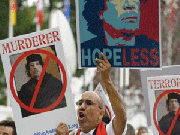Reports of more than a dozen deaths as protesters heed calls for mass protests against government, despite a crackdown
Libyan protesters seeking to oust longtime leader Moammar Gadhafi have defied a crackdown and taken to the streets on what activists have dubbed a “day of rage.”
There are reports that more than a dozen demonstrators have been killed in clashes with pro-government groups.
Opponents of Gaddafi, communicating anonymously online or working in exile, urged people to protest on Thursday to try to emulate popular uprisings which unseated long-serving rulers in neighboring Tunisia and Egypt.
“Today the Libyans broke the barrier of fear, it is a new dawn,” Faiz Jibril, an opposition leader in exile, said.
Abdullah, an eyewitness in the country’s second largest city of Benghazi, who spoke to Al Jazeera, said that he saw six unarmed protesters shot dead by police on Thursday.
He also said that the government had released 30 people from jail, paying and arming them to fight people in the street.
Opposition website Libya Al-Youm said four protesters were killed by snipers from the Internal Security Forces in the eastern city of al-Baida, which had protests on Wednesday and Thursday, AP news agency reported.
Sites monitored in Cyprus, and a Libyan human rights group based abroad, reported earlier that the protests in al-Baida had cost as many as 13 lives.
Mohammed Ali Abdellah, deputy leader of the exiled National Front for the Salvation of Libya, said that hospitals in al-Baida were experiencing a shortage of medical supplies, saying the government had refused to provide them to treat an increasing number of protesters.
Abdellah quoted hospital officials in the town as saying that about 70 people have been admitted since Wednesday night, about half of them critically injured by gunshot wounds.
The Quryna newspaper, which is close to Gaddafi’s son, cited official sources and put the death toll at two. It traced the unrest to a police shutdown of local shops that had soon escalated.
The interior ministry fired the head of security in Al-Jabal Al-Akhdar province in the aftermath of the violence, in which protesters had torched “several police cars and citizens,” the paper said on its website.
Several hundred supporters of Gaddafi also gathered in the capital, Tripoli, to counter calls for anti-government protests and they were joined by Gaddafi himself.
Clashes also broke out in the city of Zentan, southwest of the capital, in which a number of government buildings were torched.
Fathi al-Warfali, a Swiss-based activist and head of the Libyan Committee for Truth and Justice, said two more people were killed in Zentan on Thursday ,while one protester was killed in Rijban, a town about 120 km southwest of Tripoli.
He said protesters on Thursday in the coastal city of Darnah were chanting “`the people want the ouster of the regime” — a popular slogan from protests in Tunisia and Egypt — when thugs and police attacked them.
A video provided by al-Warfali of the scene in Zentan showed marchers chanting and holding a banner that read “Down with Gaddafi. Down with the regime.”
Another video showed protests by lawyers in Benghazi on Thursday demanding political and economic reform while a third depicted a demonstration in Shahat, a small town southwest of Benghazi.
Libya has been tightly controlled for over 40 years by Gaddafi, who is now Africa’s longest-serving leader.
Thursday is the anniversary of clashes that took place on February 17, 2006 in Benghazi, when security forces killed several protesters who were attacking the city’s Italian consulate.
According to reports on Twitter, the microblogging site, Libya’s regime had been sending text messages to people warning them that live bullets will be fired if they join today’s protests.
New York-based Human Rights Watch said that Libyan authorities had detained 14 activists, writers and protesters who had been preparing the anti-government demonstrations.
Al-Warfali said 11 protesters were killed in al-Baida on Wednesday night, and scores were wounded. He said the government dispatched army commandos to quell the uprising.
In a telephone interview with Al Jazeera on Wednesday, Idris Al-Mesmari, a Libyan novelist and writer, said that security officials in civilian clothes came and dispersed protesters in Benghazi using tear gas, batons and hot water.
Al-Mesmari was arrested hours after the interview.
Late on Wednesday evening, it was impossible to contact witnesses in Benghazi because telephone connections to the city appeared to be out of order.
Social media sites were reportedly blocked for several hours through the afternoon, but access was restored in the evening.
Al Jazeera is understood to have been taken off the state-owned cable TV network, but is still reportedly available on satellite networks.
Though some Libyans complain about unemployment, inequality and limits on political freedoms, analysts say that an Egypt-style revolt is unlikely because the government can use oil revenues to smooth over most social problems.
Libya accounts for about two per cent of the world’s crude oil exports.Companies including Shell, BP and Eni have invested billions of dollars in tapping its oil fields, home to the largest proven reserves in Africa.






Leave a Reply